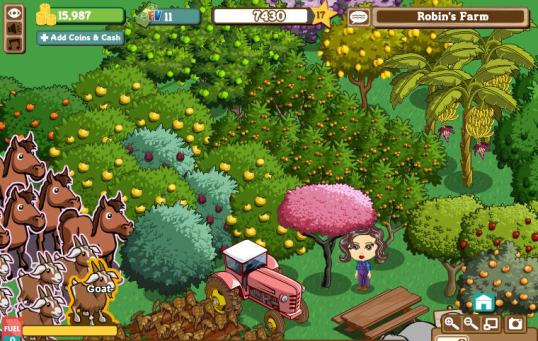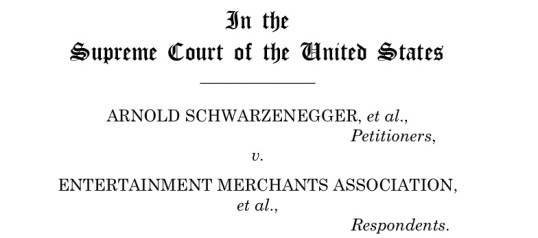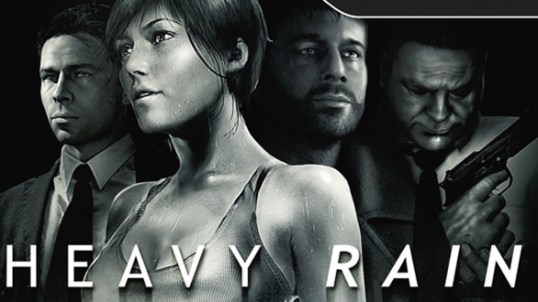The marketplace can live with both. We’ll have restrictions, perhaps. It just means that there will be different ways to distribute different things. It will probably mean that the direct relationships with publishers and developers–that can now be had thanks to the Internet and broadband connected consoles– may shift this content away from the big box stores to a different stage.
Do you think that if the Supreme Court strikes down the appellate decision, it could re-ignite the whole demonization of video games as a medium, as this cultural kind of blight?
No. There’s two-thirds of American households that have game consoles and game systems in them. You have 175 million mobile devices, all with games on them. You have on any given day, 30 million people playing a Zynga game on Facebook.
Games aren’t going away. Such a decision would just mean that how they’re consumed–in terms of the physical transaction point–may change. And, as I understand it from the attorneys that we work with, if the Supreme Court strikes down the appellate ruling, it’s only for the state of California. It’s a California bill. It doesn’t mean that the other 49 states can immediately enact this.
They would still have to draft something and go through the approval process.
Right. It took, what, two years before the Yee bill was finally signed? So it’s not an overnight process. Obviously, in some states, it can happen more quickly than others. And that means that the Entertainment Software Association (ESA) and the EMA and other lobbying groups are going to have to do a better job of managing video games’ reputation to all these different legislatures.
This is where an organization like the Video Game Voters Network, I think, can really serve a higher purpose in trying to motivate players to let their legislatures know that they play games. That games are fine and fun, and are as legitimate a form and expression of entertainment and art as anything else. So leave them the hell alone. They’d craft the message slightly differently, I’m sure. [laughs]
It’s kind of a standard media consumption argument, isn’t it? The most telling thing about the letter Stan Lee wrote for the Video Game Voters Network was him saying, essentially, “I’ve seen this before.” And you can say what you want about comic books and their merits as an art form, but the parallels are very similar.
I’ve written about that, too. There’s nothing to say that, because your creative content is disposable on a certain level, that it lacks artistic merit. I mean, comics weren’t created to be art. Stan Lee wrote things to get paid. It took a generation to live and die before he was considered a celebrated artist. He was always respected as a great comic creator. But “artist” and “comic creator” were not used in the same sentence during his heyday when he was creating these things with his partners. In comparison, games get some of the benefit of a more open mindset today than comics did 30 years ago.
Yeah, there’s more acceptance but there’s still a certain amount of trepidation probably too. Who knows, if ever, the last time Scalia or Sotormayor picked up a game controller?
It’s one of the reasons why we cited some examples of how games have changed in the Academy’s brief, We go into how they’re different and how their production requires comparable creativity, skill sets and technologies as film does. The amicus brief also notes that there are so many people in film who are creating games or are part of the process of creating games. So if you’re allowing them a free pass in film, their work in games should get one too.
On that point, I spoke with Danny Bilson at the unveiling of THQ’s new Montreal studio and he told me that games are actually his favorite medium right now. He grew up in movies. and is a third-generation movie person. So that was very telling to hear him say that. If you had to present, let’s say five games, to the Supreme Court, to kind of validate the artistic merit of the medium, what would they be?
We actually did that in our brief. We started out with a list of 120 games.
Wow. And you narrowed it down to five?
Four, actually, because the amicus briefs have a hard word count. So, as we’re going through the process with the attorneys to change wording and add extra support points, the attorneys’ crafting the brief points are saying, “Now we’re over, so what are we cutting?”
I get that from editors, too…
So, we had no shortage of games that we thought demonstrated different aspects of games as culture. But, we were directed by our attorneys–and by Jenner and Block, who is representing the ESA and EMA before the court–to stick with what they thought would have the greatest traction within the way the Supreme Court works, in terms of the examples that they wanted. Because going before the Supreme Court is not like filing and going before a lower court. It’s not like anything we see on TV. The rules of the Supreme Court are completely different, and learning that was eye-opening. Anything that’s been said and used as evidence in the lower courts, you can’t mention again, because it’s already on the record.
Oh, you’ve got to present entirely new stuff.
So, it all has to be new and you can’t use the same witnesses. Once your witness has spoken, that’s it. Once you’ve been excused on the stand, you’re really excused. And, by the way, amicus briefs can only be submitted in a certain format–they look like little digest-sized things–and they have to be bound a certain way, with only two staples not three.
That’s really bizarre.
So, it wasn’t a challenge to find examples of games as artistic expressions. The challenge was to explain the examples in a way that somebody from Mars who’s never really played a modern game would be able to see that there’s something more to this medium. Games that defied the typical banter that says games are just violent, mind-wasting exercises done to steal money from young children.
The four that made the cut were Red Dead Redemption, Assassin’s Creed II, Heavy Rain, and BioShock.
Good calls, all of them.
I was happy with all of those. I was really arguing to include The Lord of the Rings games, just because it’s something that’s lived successfully from print to the big screen to video games. It’s been imagined differently every time and it was pretty fantastic when Peter Jackson brought all those lands and creatures and battles to the screens. However, the games find a different way to enjoy that same material. And it was the crossover of talent between movie and game that we thought was a good example. But, ultimately LOTR got dropped out because we wanted to really focus on game franchises that were games first, as opposed to ones inspired from other mediums.




